Reviewing Holistic Approaches to Gastro-Intestinal Disease Management
VerifiedAdded on 2023/06/15
|34
|10348
|251
Literature Review
AI Summary
This literature review explores the role of holistic disease management in gastro-intestinal diseases, focusing on conditions like Inflammatory Bowel Disease (IBD), Crohn's disease, and ulcerative colitis. It examines the rationale for holistic approaches, emphasizing the impact of these diseases on the quality of life and the increasing prevalence of IBD. The methodology involves a comprehensive search across databases like PubMed and Medline, focusing on studies related to nursing interventions, holistic care, and environmental risk factors. The review identifies themes such as pharmacologic interventions, the role of nutrition, the impact of lifestyle and environmental factors like smoking, and the importance of psychological and emotional support. It also explores alternative treatments like fecal microbiota transplantation (FMT) and highlights the need for personalized care plans that address both the physical and psychological aspects of gastro-intestinal diseases, aiming to improve the overall well-being of patients.
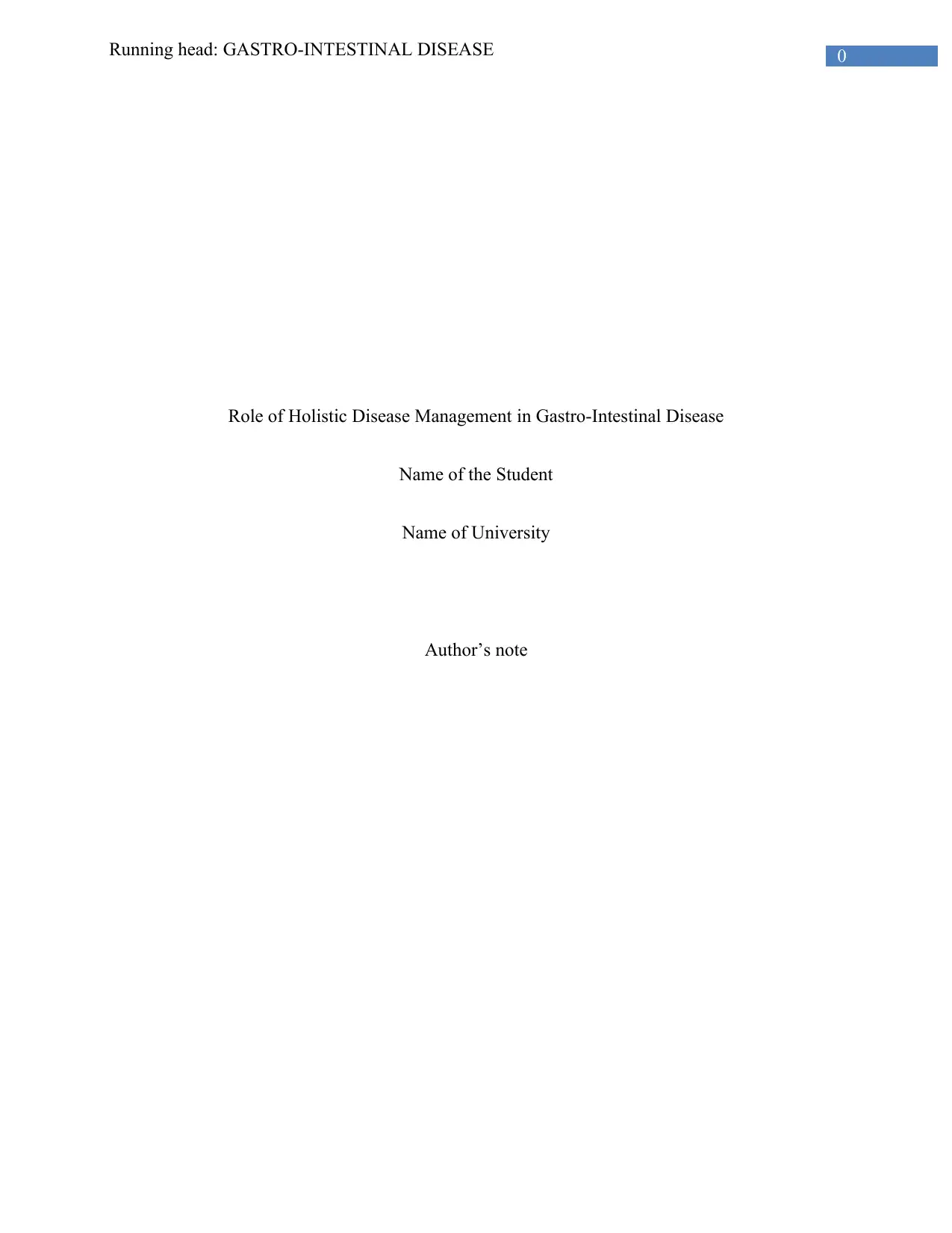
0Running head: GASTRO-INTESTINAL DISEASE
Role of Holistic Disease Management in Gastro-Intestinal Disease
Name of the Student
Name of University
Author’s note
Role of Holistic Disease Management in Gastro-Intestinal Disease
Name of the Student
Name of University
Author’s note
Paraphrase This Document
Need a fresh take? Get an instant paraphrase of this document with our AI Paraphraser
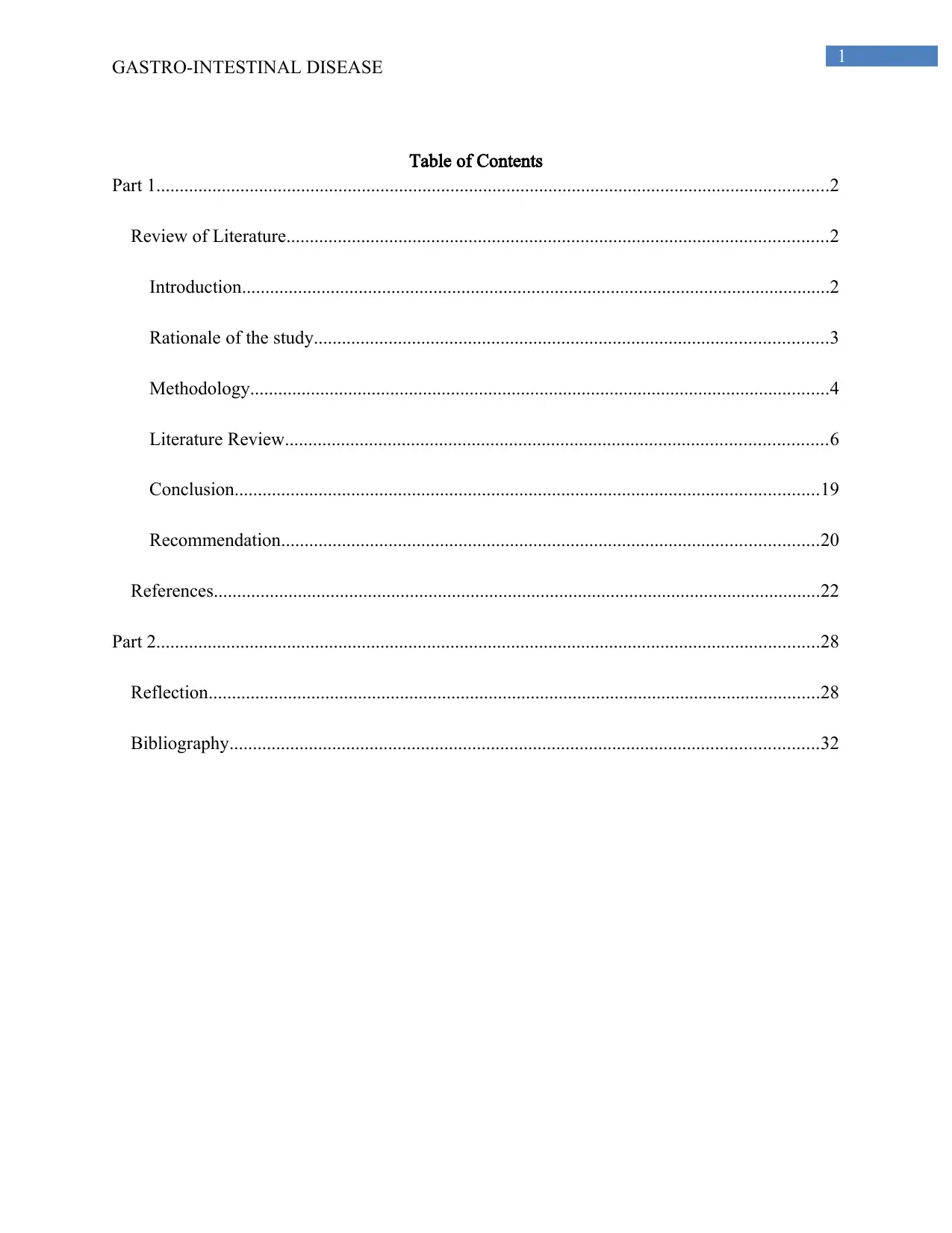
1
GASTRO-INTESTINAL DISEASE
Table of Contents
Part 1................................................................................................................................................2
Review of Literature....................................................................................................................2
Introduction..............................................................................................................................2
Rationale of the study..............................................................................................................3
Methodology............................................................................................................................4
Literature Review....................................................................................................................6
Conclusion.............................................................................................................................19
Recommendation...................................................................................................................20
References..................................................................................................................................22
Part 2..............................................................................................................................................28
Reflection...................................................................................................................................28
Bibliography..............................................................................................................................32
GASTRO-INTESTINAL DISEASE
Table of Contents
Part 1................................................................................................................................................2
Review of Literature....................................................................................................................2
Introduction..............................................................................................................................2
Rationale of the study..............................................................................................................3
Methodology............................................................................................................................4
Literature Review....................................................................................................................6
Conclusion.............................................................................................................................19
Recommendation...................................................................................................................20
References..................................................................................................................................22
Part 2..............................................................................................................................................28
Reflection...................................................................................................................................28
Bibliography..............................................................................................................................32
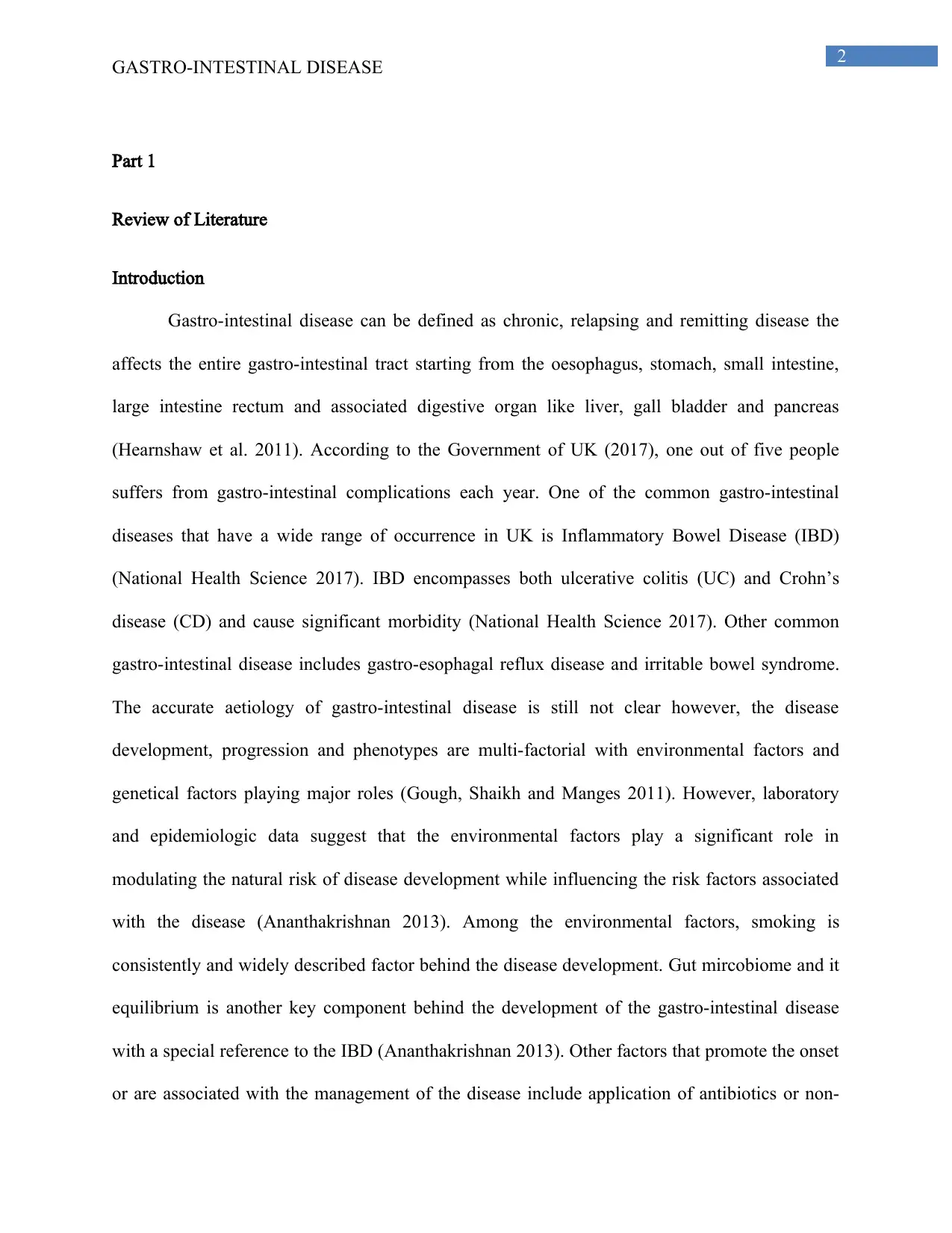
2
GASTRO-INTESTINAL DISEASE
Part 1
Review of Literature
Introduction
Gastro-intestinal disease can be defined as chronic, relapsing and remitting disease the
affects the entire gastro-intestinal tract starting from the oesophagus, stomach, small intestine,
large intestine rectum and associated digestive organ like liver, gall bladder and pancreas
(Hearnshaw et al. 2011). According to the Government of UK (2017), one out of five people
suffers from gastro-intestinal complications each year. One of the common gastro-intestinal
diseases that have a wide range of occurrence in UK is Inflammatory Bowel Disease (IBD)
(National Health Science 2017). IBD encompasses both ulcerative colitis (UC) and Crohn’s
disease (CD) and cause significant morbidity (National Health Science 2017). Other common
gastro-intestinal disease includes gastro-esophagal reflux disease and irritable bowel syndrome.
The accurate aetiology of gastro-intestinal disease is still not clear however, the disease
development, progression and phenotypes are multi-factorial with environmental factors and
genetical factors playing major roles (Gough, Shaikh and Manges 2011). However, laboratory
and epidemiologic data suggest that the environmental factors play a significant role in
modulating the natural risk of disease development while influencing the risk factors associated
with the disease (Ananthakrishnan 2013). Among the environmental factors, smoking is
consistently and widely described factor behind the disease development. Gut mircobiome and it
equilibrium is another key component behind the development of the gastro-intestinal disease
with a special reference to the IBD (Ananthakrishnan 2013). Other factors that promote the onset
or are associated with the management of the disease include application of antibiotics or non-
GASTRO-INTESTINAL DISEASE
Part 1
Review of Literature
Introduction
Gastro-intestinal disease can be defined as chronic, relapsing and remitting disease the
affects the entire gastro-intestinal tract starting from the oesophagus, stomach, small intestine,
large intestine rectum and associated digestive organ like liver, gall bladder and pancreas
(Hearnshaw et al. 2011). According to the Government of UK (2017), one out of five people
suffers from gastro-intestinal complications each year. One of the common gastro-intestinal
diseases that have a wide range of occurrence in UK is Inflammatory Bowel Disease (IBD)
(National Health Science 2017). IBD encompasses both ulcerative colitis (UC) and Crohn’s
disease (CD) and cause significant morbidity (National Health Science 2017). Other common
gastro-intestinal disease includes gastro-esophagal reflux disease and irritable bowel syndrome.
The accurate aetiology of gastro-intestinal disease is still not clear however, the disease
development, progression and phenotypes are multi-factorial with environmental factors and
genetical factors playing major roles (Gough, Shaikh and Manges 2011). However, laboratory
and epidemiologic data suggest that the environmental factors play a significant role in
modulating the natural risk of disease development while influencing the risk factors associated
with the disease (Ananthakrishnan 2013). Among the environmental factors, smoking is
consistently and widely described factor behind the disease development. Gut mircobiome and it
equilibrium is another key component behind the development of the gastro-intestinal disease
with a special reference to the IBD (Ananthakrishnan 2013). Other factors that promote the onset
or are associated with the management of the disease include application of antibiotics or non-
⊘ This is a preview!⊘
Do you want full access?
Subscribe today to unlock all pages.

Trusted by 1+ million students worldwide
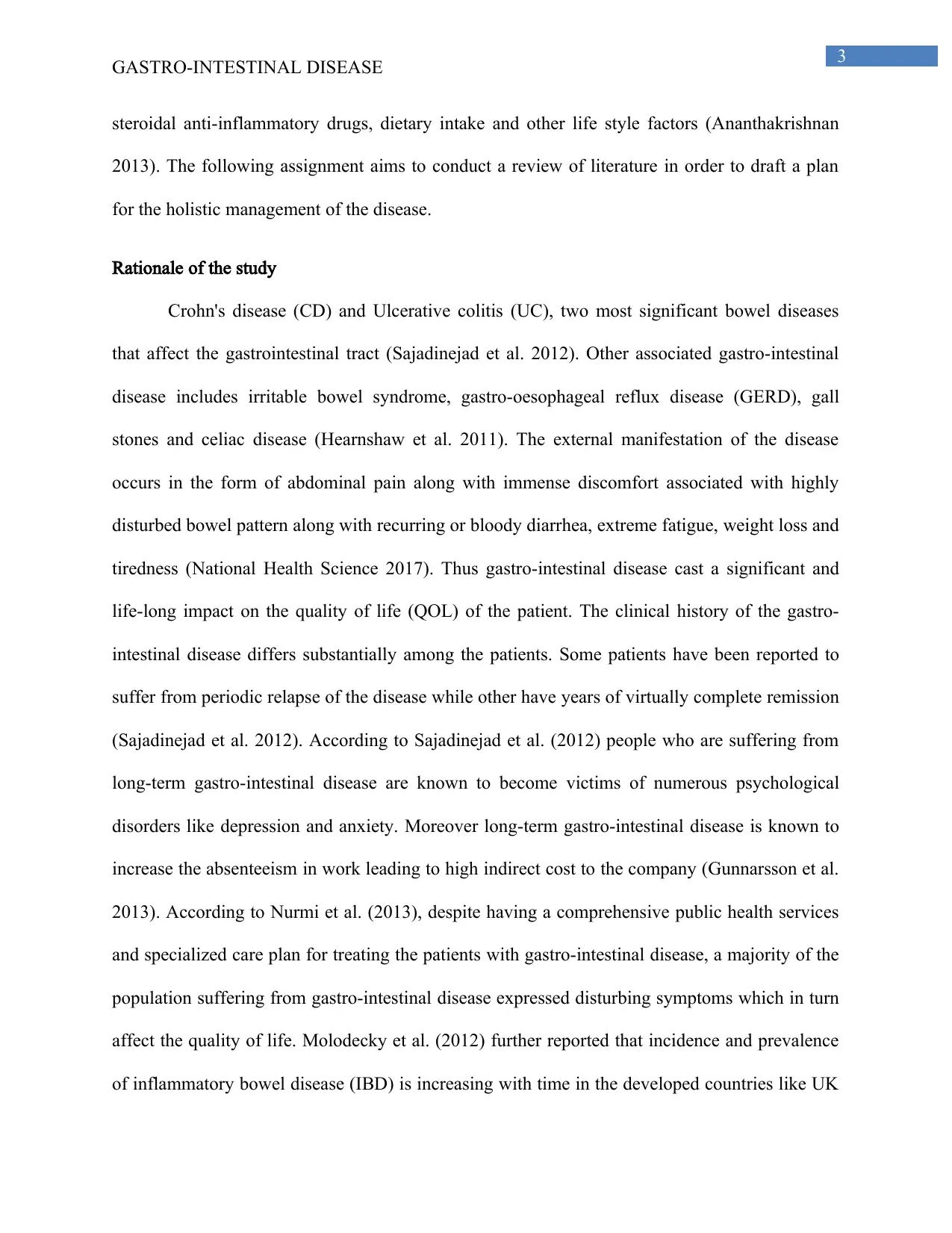
3
GASTRO-INTESTINAL DISEASE
steroidal anti-inflammatory drugs, dietary intake and other life style factors (Ananthakrishnan
2013). The following assignment aims to conduct a review of literature in order to draft a plan
for the holistic management of the disease.
Rationale of the study
Crohn's disease (CD) and Ulcerative colitis (UC), two most significant bowel diseases
that affect the gastrointestinal tract (Sajadinejad et al. 2012). Other associated gastro-intestinal
disease includes irritable bowel syndrome, gastro-oesophageal reflux disease (GERD), gall
stones and celiac disease (Hearnshaw et al. 2011). The external manifestation of the disease
occurs in the form of abdominal pain along with immense discomfort associated with highly
disturbed bowel pattern along with recurring or bloody diarrhea, extreme fatigue, weight loss and
tiredness (National Health Science 2017). Thus gastro-intestinal disease cast a significant and
life-long impact on the quality of life (QOL) of the patient. The clinical history of the gastro-
intestinal disease differs substantially among the patients. Some patients have been reported to
suffer from periodic relapse of the disease while other have years of virtually complete remission
(Sajadinejad et al. 2012). According to Sajadinejad et al. (2012) people who are suffering from
long-term gastro-intestinal disease are known to become victims of numerous psychological
disorders like depression and anxiety. Moreover long-term gastro-intestinal disease is known to
increase the absenteeism in work leading to high indirect cost to the company (Gunnarsson et al.
2013). According to Nurmi et al. (2013), despite having a comprehensive public health services
and specialized care plan for treating the patients with gastro-intestinal disease, a majority of the
population suffering from gastro-intestinal disease expressed disturbing symptoms which in turn
affect the quality of life. Molodecky et al. (2012) further reported that incidence and prevalence
of inflammatory bowel disease (IBD) is increasing with time in the developed countries like UK
GASTRO-INTESTINAL DISEASE
steroidal anti-inflammatory drugs, dietary intake and other life style factors (Ananthakrishnan
2013). The following assignment aims to conduct a review of literature in order to draft a plan
for the holistic management of the disease.
Rationale of the study
Crohn's disease (CD) and Ulcerative colitis (UC), two most significant bowel diseases
that affect the gastrointestinal tract (Sajadinejad et al. 2012). Other associated gastro-intestinal
disease includes irritable bowel syndrome, gastro-oesophageal reflux disease (GERD), gall
stones and celiac disease (Hearnshaw et al. 2011). The external manifestation of the disease
occurs in the form of abdominal pain along with immense discomfort associated with highly
disturbed bowel pattern along with recurring or bloody diarrhea, extreme fatigue, weight loss and
tiredness (National Health Science 2017). Thus gastro-intestinal disease cast a significant and
life-long impact on the quality of life (QOL) of the patient. The clinical history of the gastro-
intestinal disease differs substantially among the patients. Some patients have been reported to
suffer from periodic relapse of the disease while other have years of virtually complete remission
(Sajadinejad et al. 2012). According to Sajadinejad et al. (2012) people who are suffering from
long-term gastro-intestinal disease are known to become victims of numerous psychological
disorders like depression and anxiety. Moreover long-term gastro-intestinal disease is known to
increase the absenteeism in work leading to high indirect cost to the company (Gunnarsson et al.
2013). According to Nurmi et al. (2013), despite having a comprehensive public health services
and specialized care plan for treating the patients with gastro-intestinal disease, a majority of the
population suffering from gastro-intestinal disease expressed disturbing symptoms which in turn
affect the quality of life. Molodecky et al. (2012) further reported that incidence and prevalence
of inflammatory bowel disease (IBD) is increasing with time in the developed countries like UK
Paraphrase This Document
Need a fresh take? Get an instant paraphrase of this document with our AI Paraphraser
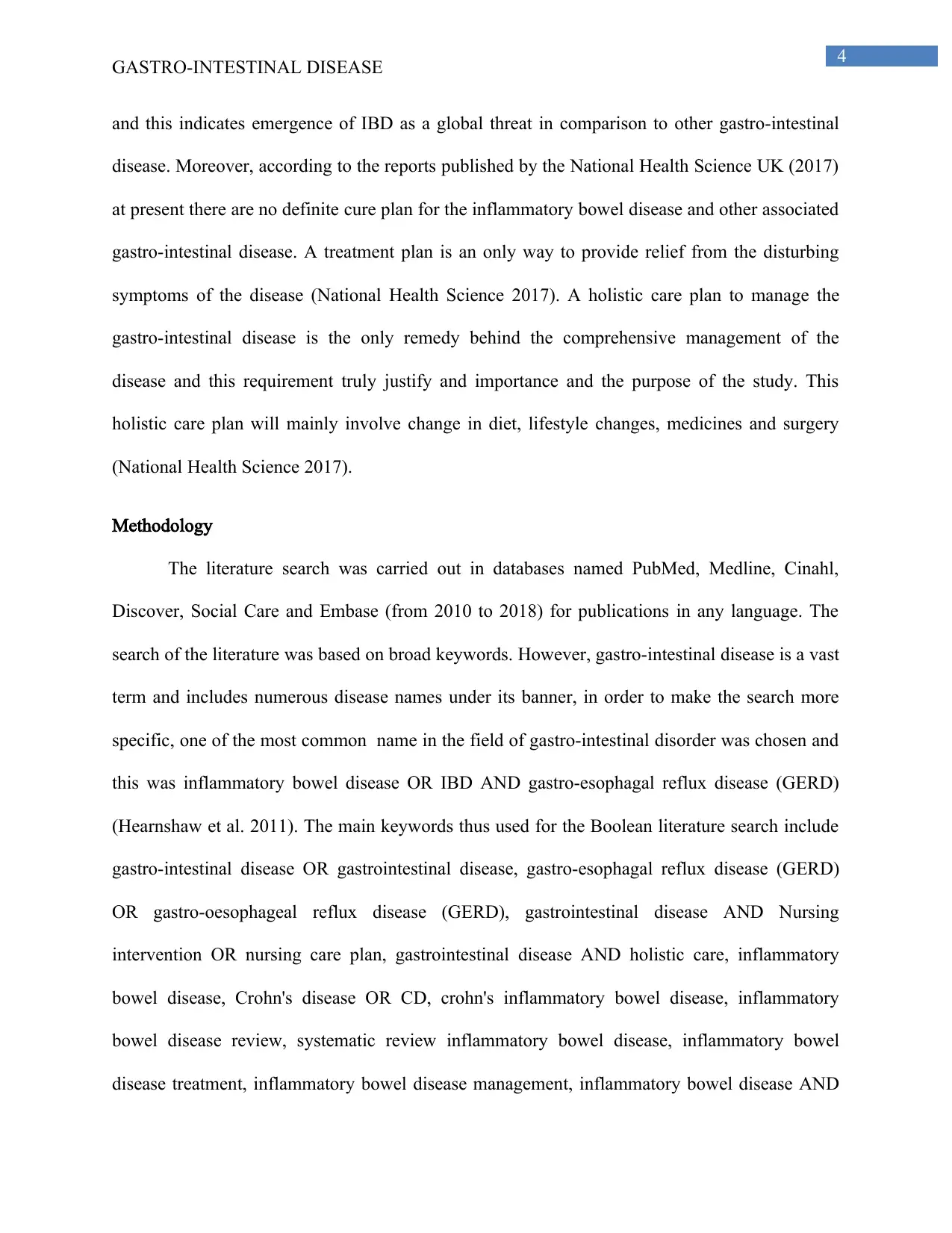
4
GASTRO-INTESTINAL DISEASE
and this indicates emergence of IBD as a global threat in comparison to other gastro-intestinal
disease. Moreover, according to the reports published by the National Health Science UK (2017)
at present there are no definite cure plan for the inflammatory bowel disease and other associated
gastro-intestinal disease. A treatment plan is an only way to provide relief from the disturbing
symptoms of the disease (National Health Science 2017). A holistic care plan to manage the
gastro-intestinal disease is the only remedy behind the comprehensive management of the
disease and this requirement truly justify and importance and the purpose of the study. This
holistic care plan will mainly involve change in diet, lifestyle changes, medicines and surgery
(National Health Science 2017).
Methodology
The literature search was carried out in databases named PubMed, Medline, Cinahl,
Discover, Social Care and Embase (from 2010 to 2018) for publications in any language. The
search of the literature was based on broad keywords. However, gastro-intestinal disease is a vast
term and includes numerous disease names under its banner, in order to make the search more
specific, one of the most common name in the field of gastro-intestinal disorder was chosen and
this was inflammatory bowel disease OR IBD AND gastro-esophagal reflux disease (GERD)
(Hearnshaw et al. 2011). The main keywords thus used for the Boolean literature search include
gastro-intestinal disease OR gastrointestinal disease, gastro-esophagal reflux disease (GERD)
OR gastro-oesophageal reflux disease (GERD), gastrointestinal disease AND Nursing
intervention OR nursing care plan, gastrointestinal disease AND holistic care, inflammatory
bowel disease, Crohn's disease OR CD, crohn's inflammatory bowel disease, inflammatory
bowel disease review, systematic review inflammatory bowel disease, inflammatory bowel
disease treatment, inflammatory bowel disease management, inflammatory bowel disease AND
GASTRO-INTESTINAL DISEASE
and this indicates emergence of IBD as a global threat in comparison to other gastro-intestinal
disease. Moreover, according to the reports published by the National Health Science UK (2017)
at present there are no definite cure plan for the inflammatory bowel disease and other associated
gastro-intestinal disease. A treatment plan is an only way to provide relief from the disturbing
symptoms of the disease (National Health Science 2017). A holistic care plan to manage the
gastro-intestinal disease is the only remedy behind the comprehensive management of the
disease and this requirement truly justify and importance and the purpose of the study. This
holistic care plan will mainly involve change in diet, lifestyle changes, medicines and surgery
(National Health Science 2017).
Methodology
The literature search was carried out in databases named PubMed, Medline, Cinahl,
Discover, Social Care and Embase (from 2010 to 2018) for publications in any language. The
search of the literature was based on broad keywords. However, gastro-intestinal disease is a vast
term and includes numerous disease names under its banner, in order to make the search more
specific, one of the most common name in the field of gastro-intestinal disorder was chosen and
this was inflammatory bowel disease OR IBD AND gastro-esophagal reflux disease (GERD)
(Hearnshaw et al. 2011). The main keywords thus used for the Boolean literature search include
gastro-intestinal disease OR gastrointestinal disease, gastro-esophagal reflux disease (GERD)
OR gastro-oesophageal reflux disease (GERD), gastrointestinal disease AND Nursing
intervention OR nursing care plan, gastrointestinal disease AND holistic care, inflammatory
bowel disease, Crohn's disease OR CD, crohn's inflammatory bowel disease, inflammatory
bowel disease review, systematic review inflammatory bowel disease, inflammatory bowel
disease treatment, inflammatory bowel disease management, inflammatory bowel disease AND
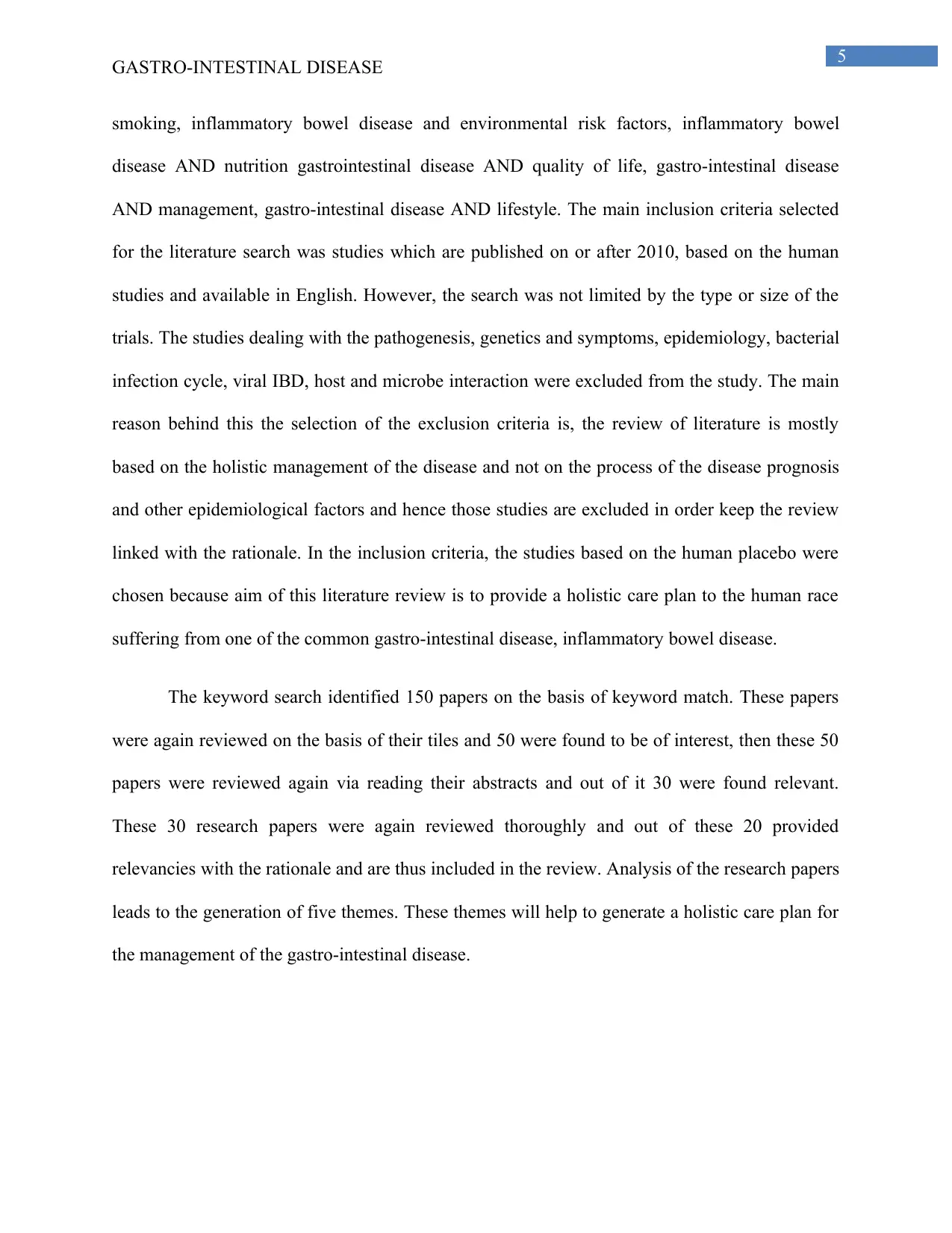
5
GASTRO-INTESTINAL DISEASE
smoking, inflammatory bowel disease and environmental risk factors, inflammatory bowel
disease AND nutrition gastrointestinal disease AND quality of life, gastro-intestinal disease
AND management, gastro-intestinal disease AND lifestyle. The main inclusion criteria selected
for the literature search was studies which are published on or after 2010, based on the human
studies and available in English. However, the search was not limited by the type or size of the
trials. The studies dealing with the pathogenesis, genetics and symptoms, epidemiology, bacterial
infection cycle, viral IBD, host and microbe interaction were excluded from the study. The main
reason behind this the selection of the exclusion criteria is, the review of literature is mostly
based on the holistic management of the disease and not on the process of the disease prognosis
and other epidemiological factors and hence those studies are excluded in order keep the review
linked with the rationale. In the inclusion criteria, the studies based on the human placebo were
chosen because aim of this literature review is to provide a holistic care plan to the human race
suffering from one of the common gastro-intestinal disease, inflammatory bowel disease.
The keyword search identified 150 papers on the basis of keyword match. These papers
were again reviewed on the basis of their tiles and 50 were found to be of interest, then these 50
papers were reviewed again via reading their abstracts and out of it 30 were found relevant.
These 30 research papers were again reviewed thoroughly and out of these 20 provided
relevancies with the rationale and are thus included in the review. Analysis of the research papers
leads to the generation of five themes. These themes will help to generate a holistic care plan for
the management of the gastro-intestinal disease.
GASTRO-INTESTINAL DISEASE
smoking, inflammatory bowel disease and environmental risk factors, inflammatory bowel
disease AND nutrition gastrointestinal disease AND quality of life, gastro-intestinal disease
AND management, gastro-intestinal disease AND lifestyle. The main inclusion criteria selected
for the literature search was studies which are published on or after 2010, based on the human
studies and available in English. However, the search was not limited by the type or size of the
trials. The studies dealing with the pathogenesis, genetics and symptoms, epidemiology, bacterial
infection cycle, viral IBD, host and microbe interaction were excluded from the study. The main
reason behind this the selection of the exclusion criteria is, the review of literature is mostly
based on the holistic management of the disease and not on the process of the disease prognosis
and other epidemiological factors and hence those studies are excluded in order keep the review
linked with the rationale. In the inclusion criteria, the studies based on the human placebo were
chosen because aim of this literature review is to provide a holistic care plan to the human race
suffering from one of the common gastro-intestinal disease, inflammatory bowel disease.
The keyword search identified 150 papers on the basis of keyword match. These papers
were again reviewed on the basis of their tiles and 50 were found to be of interest, then these 50
papers were reviewed again via reading their abstracts and out of it 30 were found relevant.
These 30 research papers were again reviewed thoroughly and out of these 20 provided
relevancies with the rationale and are thus included in the review. Analysis of the research papers
leads to the generation of five themes. These themes will help to generate a holistic care plan for
the management of the gastro-intestinal disease.
⊘ This is a preview!⊘
Do you want full access?
Subscribe today to unlock all pages.

Trusted by 1+ million students worldwide
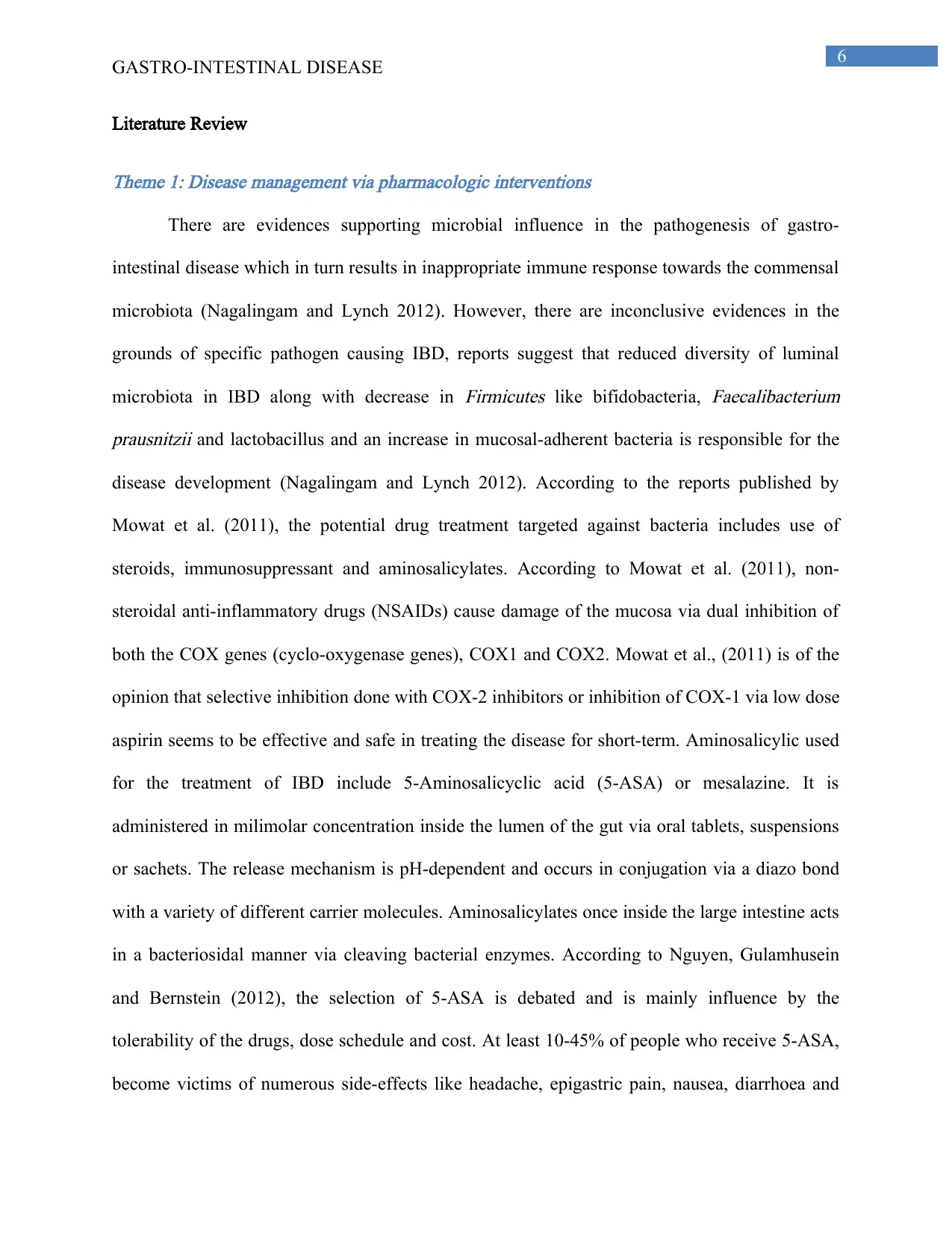
6
GASTRO-INTESTINAL DISEASE
Literature Review
Theme 1: Disease management via pharmacologic interventions
There are evidences supporting microbial influence in the pathogenesis of gastro-
intestinal disease which in turn results in inappropriate immune response towards the commensal
microbiota (Nagalingam and Lynch 2012). However, there are inconclusive evidences in the
grounds of specific pathogen causing IBD, reports suggest that reduced diversity of luminal
microbiota in IBD along with decrease in
Firmicutes like bifidobacteria,
Faecalibacterium
prausnitzii and lactobacillus and an increase in mucosal-adherent bacteria is responsible for the
disease development (Nagalingam and Lynch 2012). According to the reports published by
Mowat et al. (2011), the potential drug treatment targeted against bacteria includes use of
steroids, immunosuppressant and aminosalicylates. According to Mowat et al. (2011), non-
steroidal anti-inflammatory drugs (NSAIDs) cause damage of the mucosa via dual inhibition of
both the COX genes (cyclo-oxygenase genes), COX1 and COX2. Mowat et al., (2011) is of the
opinion that selective inhibition done with COX-2 inhibitors or inhibition of COX-1 via low dose
aspirin seems to be effective and safe in treating the disease for short-term. Aminosalicylic used
for the treatment of IBD include 5-Aminosalicyclic acid (5-ASA) or mesalazine. It is
administered in milimolar concentration inside the lumen of the gut via oral tablets, suspensions
or sachets. The release mechanism is pH-dependent and occurs in conjugation via a diazo bond
with a variety of different carrier molecules. Aminosalicylates once inside the large intestine acts
in a bacteriosidal manner via cleaving bacterial enzymes. According to Nguyen, Gulamhusein
and Bernstein (2012), the selection of 5-ASA is debated and is mainly influence by the
tolerability of the drugs, dose schedule and cost. At least 10-45% of people who receive 5-ASA,
become victims of numerous side-effects like headache, epigastric pain, nausea, diarrhoea and
GASTRO-INTESTINAL DISEASE
Literature Review
Theme 1: Disease management via pharmacologic interventions
There are evidences supporting microbial influence in the pathogenesis of gastro-
intestinal disease which in turn results in inappropriate immune response towards the commensal
microbiota (Nagalingam and Lynch 2012). However, there are inconclusive evidences in the
grounds of specific pathogen causing IBD, reports suggest that reduced diversity of luminal
microbiota in IBD along with decrease in
Firmicutes like bifidobacteria,
Faecalibacterium
prausnitzii and lactobacillus and an increase in mucosal-adherent bacteria is responsible for the
disease development (Nagalingam and Lynch 2012). According to the reports published by
Mowat et al. (2011), the potential drug treatment targeted against bacteria includes use of
steroids, immunosuppressant and aminosalicylates. According to Mowat et al. (2011), non-
steroidal anti-inflammatory drugs (NSAIDs) cause damage of the mucosa via dual inhibition of
both the COX genes (cyclo-oxygenase genes), COX1 and COX2. Mowat et al., (2011) is of the
opinion that selective inhibition done with COX-2 inhibitors or inhibition of COX-1 via low dose
aspirin seems to be effective and safe in treating the disease for short-term. Aminosalicylic used
for the treatment of IBD include 5-Aminosalicyclic acid (5-ASA) or mesalazine. It is
administered in milimolar concentration inside the lumen of the gut via oral tablets, suspensions
or sachets. The release mechanism is pH-dependent and occurs in conjugation via a diazo bond
with a variety of different carrier molecules. Aminosalicylates once inside the large intestine acts
in a bacteriosidal manner via cleaving bacterial enzymes. According to Nguyen, Gulamhusein
and Bernstein (2012), the selection of 5-ASA is debated and is mainly influence by the
tolerability of the drugs, dose schedule and cost. At least 10-45% of people who receive 5-ASA,
become victims of numerous side-effects like headache, epigastric pain, nausea, diarrhoea and
Paraphrase This Document
Need a fresh take? Get an instant paraphrase of this document with our AI Paraphraser
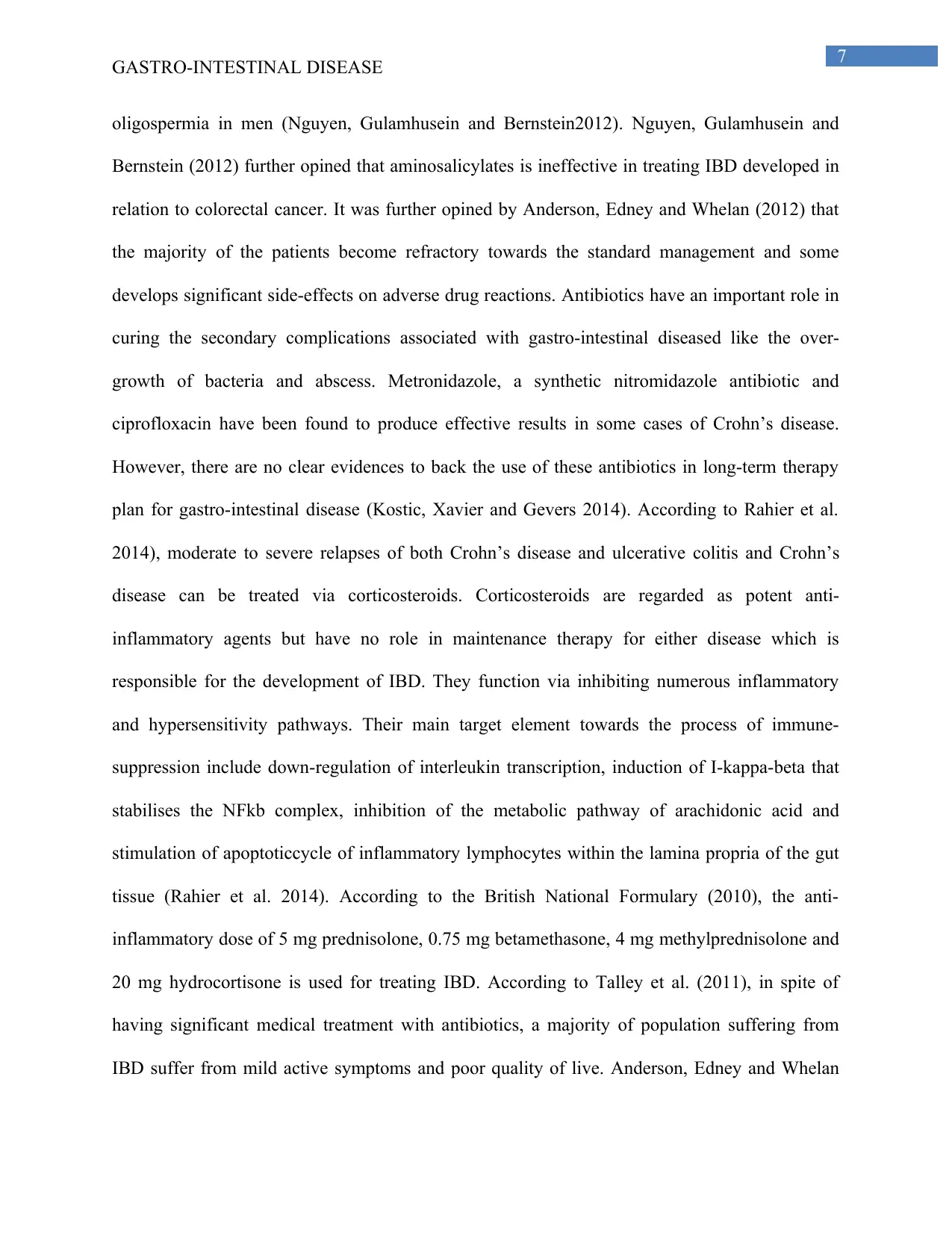
7
GASTRO-INTESTINAL DISEASE
oligospermia in men (Nguyen, Gulamhusein and Bernstein2012). Nguyen, Gulamhusein and
Bernstein (2012) further opined that aminosalicylates is ineffective in treating IBD developed in
relation to colorectal cancer. It was further opined by Anderson, Edney and Whelan (2012) that
the majority of the patients become refractory towards the standard management and some
develops significant side-effects on adverse drug reactions. Antibiotics have an important role in
curing the secondary complications associated with gastro-intestinal diseased like the over-
growth of bacteria and abscess. Metronidazole, a synthetic nitromidazole antibiotic and
ciprofloxacin have been found to produce effective results in some cases of Crohn’s disease.
However, there are no clear evidences to back the use of these antibiotics in long-term therapy
plan for gastro-intestinal disease (Kostic, Xavier and Gevers 2014). According to Rahier et al.
2014), moderate to severe relapses of both Crohn’s disease and ulcerative colitis and Crohn’s
disease can be treated via corticosteroids. Corticosteroids are regarded as potent anti-
inflammatory agents but have no role in maintenance therapy for either disease which is
responsible for the development of IBD. They function via inhibiting numerous inflammatory
and hypersensitivity pathways. Their main target element towards the process of immune-
suppression include down-regulation of interleukin transcription, induction of I-kappa-beta that
stabilises the NFkb complex, inhibition of the metabolic pathway of arachidonic acid and
stimulation of apoptoticcycle of inflammatory lymphocytes within the lamina propria of the gut
tissue (Rahier et al. 2014). According to the British National Formulary (2010), the anti-
inflammatory dose of 5 mg prednisolone, 0.75 mg betamethasone, 4 mg methylprednisolone and
20 mg hydrocortisone is used for treating IBD. According to Talley et al. (2011), in spite of
having significant medical treatment with antibiotics, a majority of population suffering from
IBD suffer from mild active symptoms and poor quality of live. Anderson, Edney and Whelan
GASTRO-INTESTINAL DISEASE
oligospermia in men (Nguyen, Gulamhusein and Bernstein2012). Nguyen, Gulamhusein and
Bernstein (2012) further opined that aminosalicylates is ineffective in treating IBD developed in
relation to colorectal cancer. It was further opined by Anderson, Edney and Whelan (2012) that
the majority of the patients become refractory towards the standard management and some
develops significant side-effects on adverse drug reactions. Antibiotics have an important role in
curing the secondary complications associated with gastro-intestinal diseased like the over-
growth of bacteria and abscess. Metronidazole, a synthetic nitromidazole antibiotic and
ciprofloxacin have been found to produce effective results in some cases of Crohn’s disease.
However, there are no clear evidences to back the use of these antibiotics in long-term therapy
plan for gastro-intestinal disease (Kostic, Xavier and Gevers 2014). According to Rahier et al.
2014), moderate to severe relapses of both Crohn’s disease and ulcerative colitis and Crohn’s
disease can be treated via corticosteroids. Corticosteroids are regarded as potent anti-
inflammatory agents but have no role in maintenance therapy for either disease which is
responsible for the development of IBD. They function via inhibiting numerous inflammatory
and hypersensitivity pathways. Their main target element towards the process of immune-
suppression include down-regulation of interleukin transcription, induction of I-kappa-beta that
stabilises the NFkb complex, inhibition of the metabolic pathway of arachidonic acid and
stimulation of apoptoticcycle of inflammatory lymphocytes within the lamina propria of the gut
tissue (Rahier et al. 2014). According to the British National Formulary (2010), the anti-
inflammatory dose of 5 mg prednisolone, 0.75 mg betamethasone, 4 mg methylprednisolone and
20 mg hydrocortisone is used for treating IBD. According to Talley et al. (2011), in spite of
having significant medical treatment with antibiotics, a majority of population suffering from
IBD suffer from mild active symptoms and poor quality of live. Anderson, Edney and Whelan
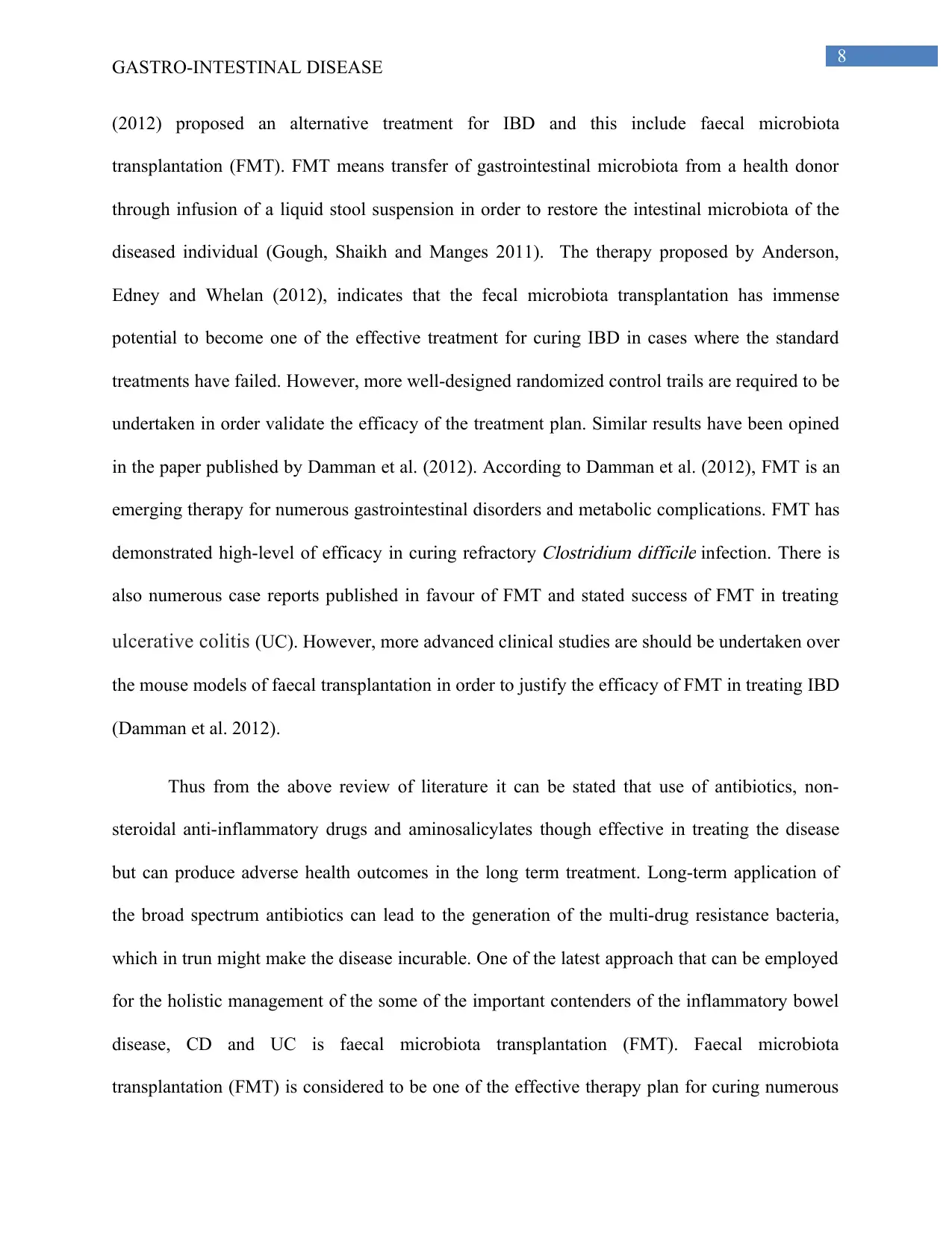
8
GASTRO-INTESTINAL DISEASE
(2012) proposed an alternative treatment for IBD and this include faecal microbiota
transplantation (FMT). FMT means transfer of gastrointestinal microbiota from a health donor
through infusion of a liquid stool suspension in order to restore the intestinal microbiota of the
diseased individual (Gough, Shaikh and Manges 2011). The therapy proposed by Anderson,
Edney and Whelan (2012), indicates that the fecal microbiota transplantation has immense
potential to become one of the effective treatment for curing IBD in cases where the standard
treatments have failed. However, more well-designed randomized control trails are required to be
undertaken in order validate the efficacy of the treatment plan. Similar results have been opined
in the paper published by Damman et al. (2012). According to Damman et al. (2012), FMT is an
emerging therapy for numerous gastrointestinal disorders and metabolic complications. FMT has
demonstrated high-level of efficacy in curing refractory
Clostridium difficile infection. There is
also numerous case reports published in favour of FMT and stated success of FMT in treating
ulcerative colitis (UC). However, more advanced clinical studies are should be undertaken over
the mouse models of faecal transplantation in order to justify the efficacy of FMT in treating IBD
(Damman et al. 2012).
Thus from the above review of literature it can be stated that use of antibiotics, non-
steroidal anti-inflammatory drugs and aminosalicylates though effective in treating the disease
but can produce adverse health outcomes in the long term treatment. Long-term application of
the broad spectrum antibiotics can lead to the generation of the multi-drug resistance bacteria,
which in trun might make the disease incurable. One of the latest approach that can be employed
for the holistic management of the some of the important contenders of the inflammatory bowel
disease, CD and UC is faecal microbiota transplantation (FMT). Faecal microbiota
transplantation (FMT) is considered to be one of the effective therapy plan for curing numerous
GASTRO-INTESTINAL DISEASE
(2012) proposed an alternative treatment for IBD and this include faecal microbiota
transplantation (FMT). FMT means transfer of gastrointestinal microbiota from a health donor
through infusion of a liquid stool suspension in order to restore the intestinal microbiota of the
diseased individual (Gough, Shaikh and Manges 2011). The therapy proposed by Anderson,
Edney and Whelan (2012), indicates that the fecal microbiota transplantation has immense
potential to become one of the effective treatment for curing IBD in cases where the standard
treatments have failed. However, more well-designed randomized control trails are required to be
undertaken in order validate the efficacy of the treatment plan. Similar results have been opined
in the paper published by Damman et al. (2012). According to Damman et al. (2012), FMT is an
emerging therapy for numerous gastrointestinal disorders and metabolic complications. FMT has
demonstrated high-level of efficacy in curing refractory
Clostridium difficile infection. There is
also numerous case reports published in favour of FMT and stated success of FMT in treating
ulcerative colitis (UC). However, more advanced clinical studies are should be undertaken over
the mouse models of faecal transplantation in order to justify the efficacy of FMT in treating IBD
(Damman et al. 2012).
Thus from the above review of literature it can be stated that use of antibiotics, non-
steroidal anti-inflammatory drugs and aminosalicylates though effective in treating the disease
but can produce adverse health outcomes in the long term treatment. Long-term application of
the broad spectrum antibiotics can lead to the generation of the multi-drug resistance bacteria,
which in trun might make the disease incurable. One of the latest approach that can be employed
for the holistic management of the some of the important contenders of the inflammatory bowel
disease, CD and UC is faecal microbiota transplantation (FMT). Faecal microbiota
transplantation (FMT) is considered to be one of the effective therapy plan for curing numerous
⊘ This is a preview!⊘
Do you want full access?
Subscribe today to unlock all pages.

Trusted by 1+ million students worldwide
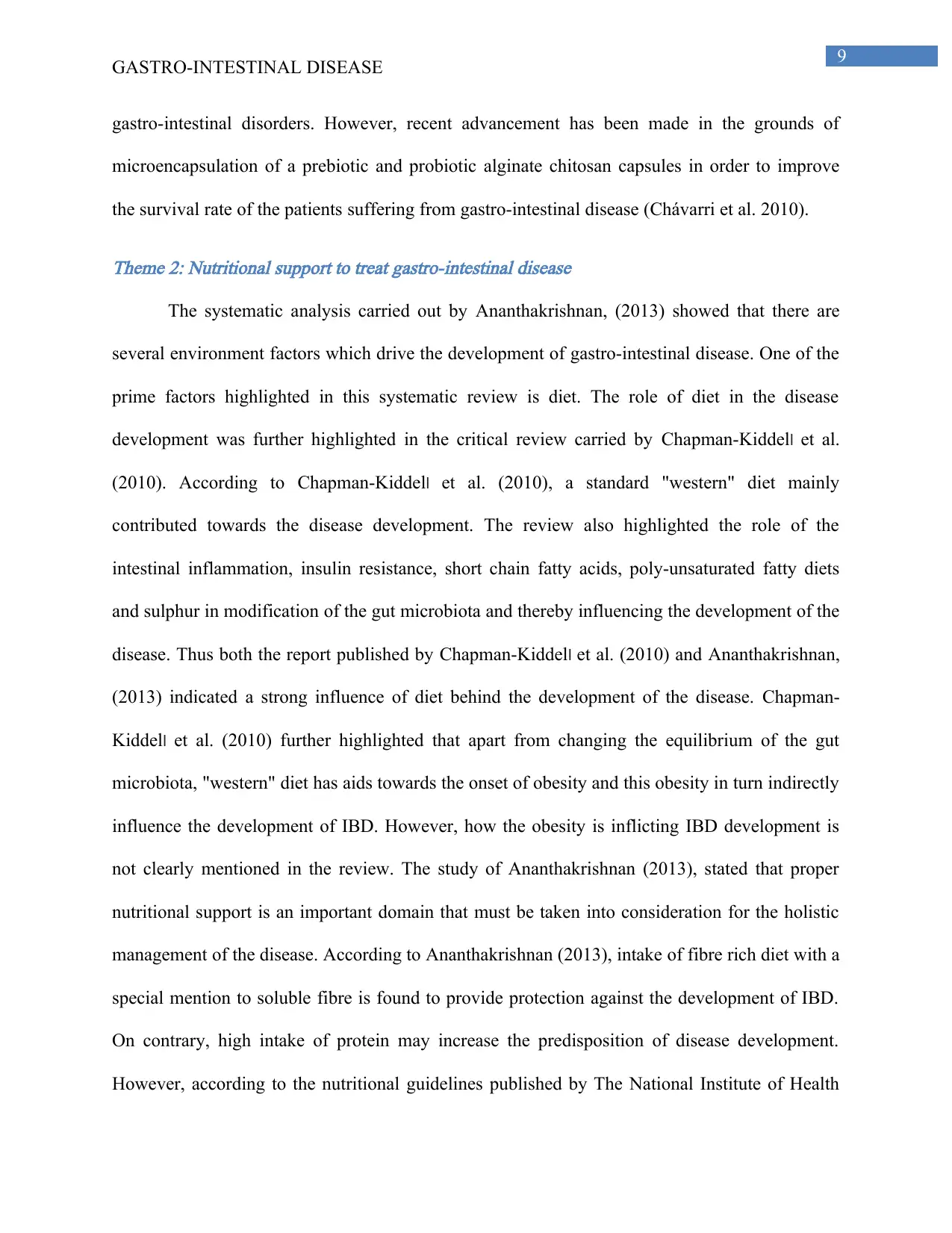
9
GASTRO-INTESTINAL DISEASE
gastro-intestinal disorders. However, recent advancement has been made in the grounds of
microencapsulation of a prebiotic and probiotic alginate chitosan capsules in order to improve
the survival rate of the patients suffering from gastro-intestinal disease (Chávarri et al. 2010).
Theme 2: Nutritional support to treat gastro-intestinal disease
The systematic analysis carried out by Ananthakrishnan, (2013) showed that there are
several environment factors which drive the development of gastro-intestinal disease. One of the
prime factors highlighted in this systematic review is diet. The role of diet in the disease
development was further highlighted in the critical review carried by Chapman‐Kiddell et al.
(2010). According to Chapman‐Kiddell et al. (2010), a standard "western" diet mainly
contributed towards the disease development. The review also highlighted the role of the
intestinal inflammation, insulin resistance, short chain fatty acids, poly-unsaturated fatty diets
and sulphur in modification of the gut microbiota and thereby influencing the development of the
disease. Thus both the report published by Chapman‐Kiddell et al. (2010) and Ananthakrishnan,
(2013) indicated a strong influence of diet behind the development of the disease. Chapman‐
Kiddell et al. (2010) further highlighted that apart from changing the equilibrium of the gut
microbiota, "western" diet has aids towards the onset of obesity and this obesity in turn indirectly
influence the development of IBD. However, how the obesity is inflicting IBD development is
not clearly mentioned in the review. The study of Ananthakrishnan (2013), stated that proper
nutritional support is an important domain that must be taken into consideration for the holistic
management of the disease. According to Ananthakrishnan (2013), intake of fibre rich diet with a
special mention to soluble fibre is found to provide protection against the development of IBD.
On contrary, high intake of protein may increase the predisposition of disease development.
However, according to the nutritional guidelines published by The National Institute of Health
GASTRO-INTESTINAL DISEASE
gastro-intestinal disorders. However, recent advancement has been made in the grounds of
microencapsulation of a prebiotic and probiotic alginate chitosan capsules in order to improve
the survival rate of the patients suffering from gastro-intestinal disease (Chávarri et al. 2010).
Theme 2: Nutritional support to treat gastro-intestinal disease
The systematic analysis carried out by Ananthakrishnan, (2013) showed that there are
several environment factors which drive the development of gastro-intestinal disease. One of the
prime factors highlighted in this systematic review is diet. The role of diet in the disease
development was further highlighted in the critical review carried by Chapman‐Kiddell et al.
(2010). According to Chapman‐Kiddell et al. (2010), a standard "western" diet mainly
contributed towards the disease development. The review also highlighted the role of the
intestinal inflammation, insulin resistance, short chain fatty acids, poly-unsaturated fatty diets
and sulphur in modification of the gut microbiota and thereby influencing the development of the
disease. Thus both the report published by Chapman‐Kiddell et al. (2010) and Ananthakrishnan,
(2013) indicated a strong influence of diet behind the development of the disease. Chapman‐
Kiddell et al. (2010) further highlighted that apart from changing the equilibrium of the gut
microbiota, "western" diet has aids towards the onset of obesity and this obesity in turn indirectly
influence the development of IBD. However, how the obesity is inflicting IBD development is
not clearly mentioned in the review. The study of Ananthakrishnan (2013), stated that proper
nutritional support is an important domain that must be taken into consideration for the holistic
management of the disease. According to Ananthakrishnan (2013), intake of fibre rich diet with a
special mention to soluble fibre is found to provide protection against the development of IBD.
On contrary, high intake of protein may increase the predisposition of disease development.
However, according to the nutritional guidelines published by The National Institute of Health
Paraphrase This Document
Need a fresh take? Get an instant paraphrase of this document with our AI Paraphraser
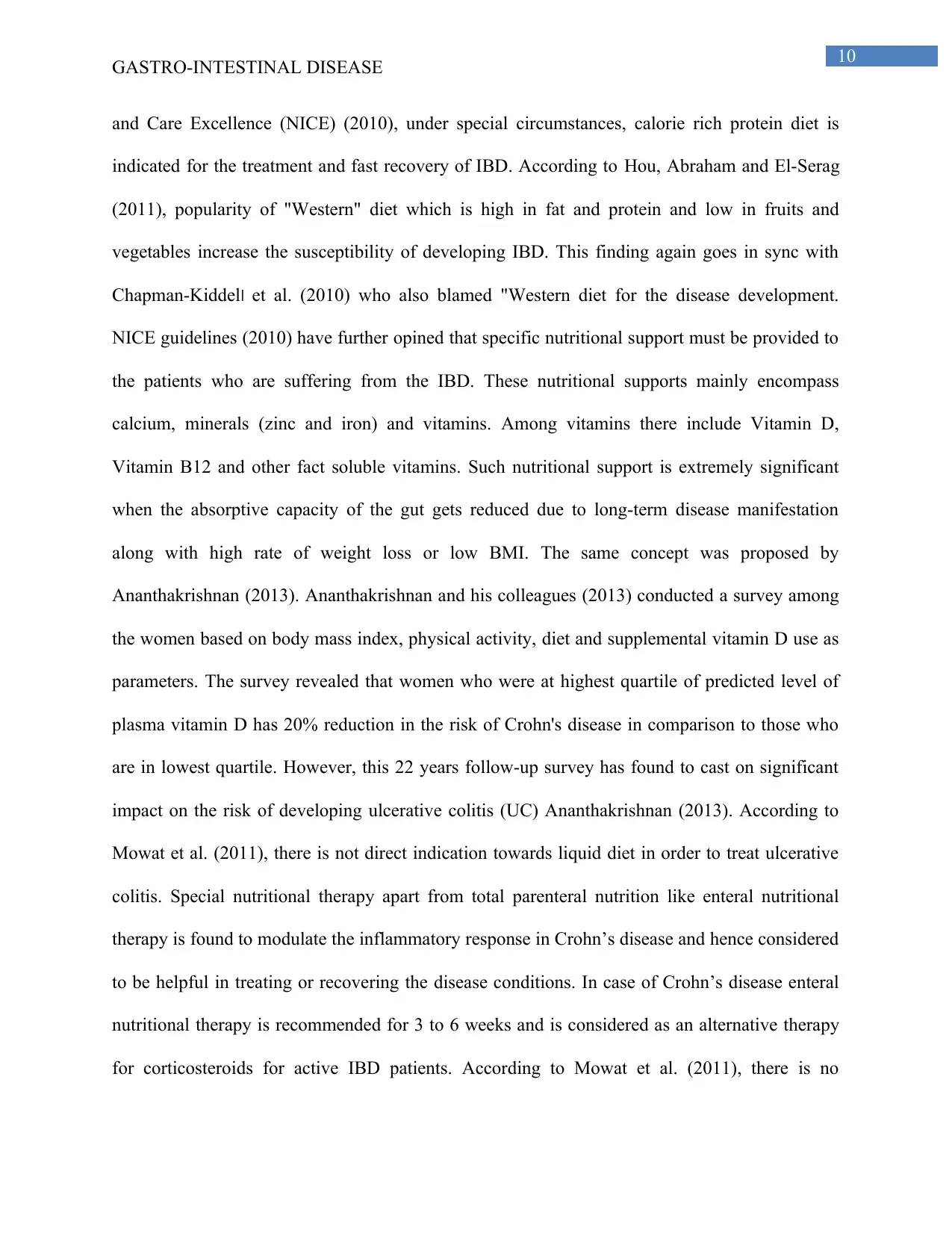
10
GASTRO-INTESTINAL DISEASE
and Care Excellence (NICE) (2010), under special circumstances, calorie rich protein diet is
indicated for the treatment and fast recovery of IBD. According to Hou, Abraham and El-Serag
(2011), popularity of "Western" diet which is high in fat and protein and low in fruits and
vegetables increase the susceptibility of developing IBD. This finding again goes in sync with
Chapman‐Kiddell et al. (2010) who also blamed "Western diet for the disease development.
NICE guidelines (2010) have further opined that specific nutritional support must be provided to
the patients who are suffering from the IBD. These nutritional supports mainly encompass
calcium, minerals (zinc and iron) and vitamins. Among vitamins there include Vitamin D,
Vitamin B12 and other fact soluble vitamins. Such nutritional support is extremely significant
when the absorptive capacity of the gut gets reduced due to long-term disease manifestation
along with high rate of weight loss or low BMI. The same concept was proposed by
Ananthakrishnan (2013). Ananthakrishnan and his colleagues (2013) conducted a survey among
the women based on body mass index, physical activity, diet and supplemental vitamin D use as
parameters. The survey revealed that women who were at highest quartile of predicted level of
plasma vitamin D has 20% reduction in the risk of Crohn's disease in comparison to those who
are in lowest quartile. However, this 22 years follow-up survey has found to cast on significant
impact on the risk of developing ulcerative colitis (UC) Ananthakrishnan (2013). According to
Mowat et al. (2011), there is not direct indication towards liquid diet in order to treat ulcerative
colitis. Special nutritional therapy apart from total parenteral nutrition like enteral nutritional
therapy is found to modulate the inflammatory response in Crohn’s disease and hence considered
to be helpful in treating or recovering the disease conditions. In case of Crohn’s disease enteral
nutritional therapy is recommended for 3 to 6 weeks and is considered as an alternative therapy
for corticosteroids for active IBD patients. According to Mowat et al. (2011), there is no
GASTRO-INTESTINAL DISEASE
and Care Excellence (NICE) (2010), under special circumstances, calorie rich protein diet is
indicated for the treatment and fast recovery of IBD. According to Hou, Abraham and El-Serag
(2011), popularity of "Western" diet which is high in fat and protein and low in fruits and
vegetables increase the susceptibility of developing IBD. This finding again goes in sync with
Chapman‐Kiddell et al. (2010) who also blamed "Western diet for the disease development.
NICE guidelines (2010) have further opined that specific nutritional support must be provided to
the patients who are suffering from the IBD. These nutritional supports mainly encompass
calcium, minerals (zinc and iron) and vitamins. Among vitamins there include Vitamin D,
Vitamin B12 and other fact soluble vitamins. Such nutritional support is extremely significant
when the absorptive capacity of the gut gets reduced due to long-term disease manifestation
along with high rate of weight loss or low BMI. The same concept was proposed by
Ananthakrishnan (2013). Ananthakrishnan and his colleagues (2013) conducted a survey among
the women based on body mass index, physical activity, diet and supplemental vitamin D use as
parameters. The survey revealed that women who were at highest quartile of predicted level of
plasma vitamin D has 20% reduction in the risk of Crohn's disease in comparison to those who
are in lowest quartile. However, this 22 years follow-up survey has found to cast on significant
impact on the risk of developing ulcerative colitis (UC) Ananthakrishnan (2013). According to
Mowat et al. (2011), there is not direct indication towards liquid diet in order to treat ulcerative
colitis. Special nutritional therapy apart from total parenteral nutrition like enteral nutritional
therapy is found to modulate the inflammatory response in Crohn’s disease and hence considered
to be helpful in treating or recovering the disease conditions. In case of Crohn’s disease enteral
nutritional therapy is recommended for 3 to 6 weeks and is considered as an alternative therapy
for corticosteroids for active IBD patients. According to Mowat et al. (2011), there is no
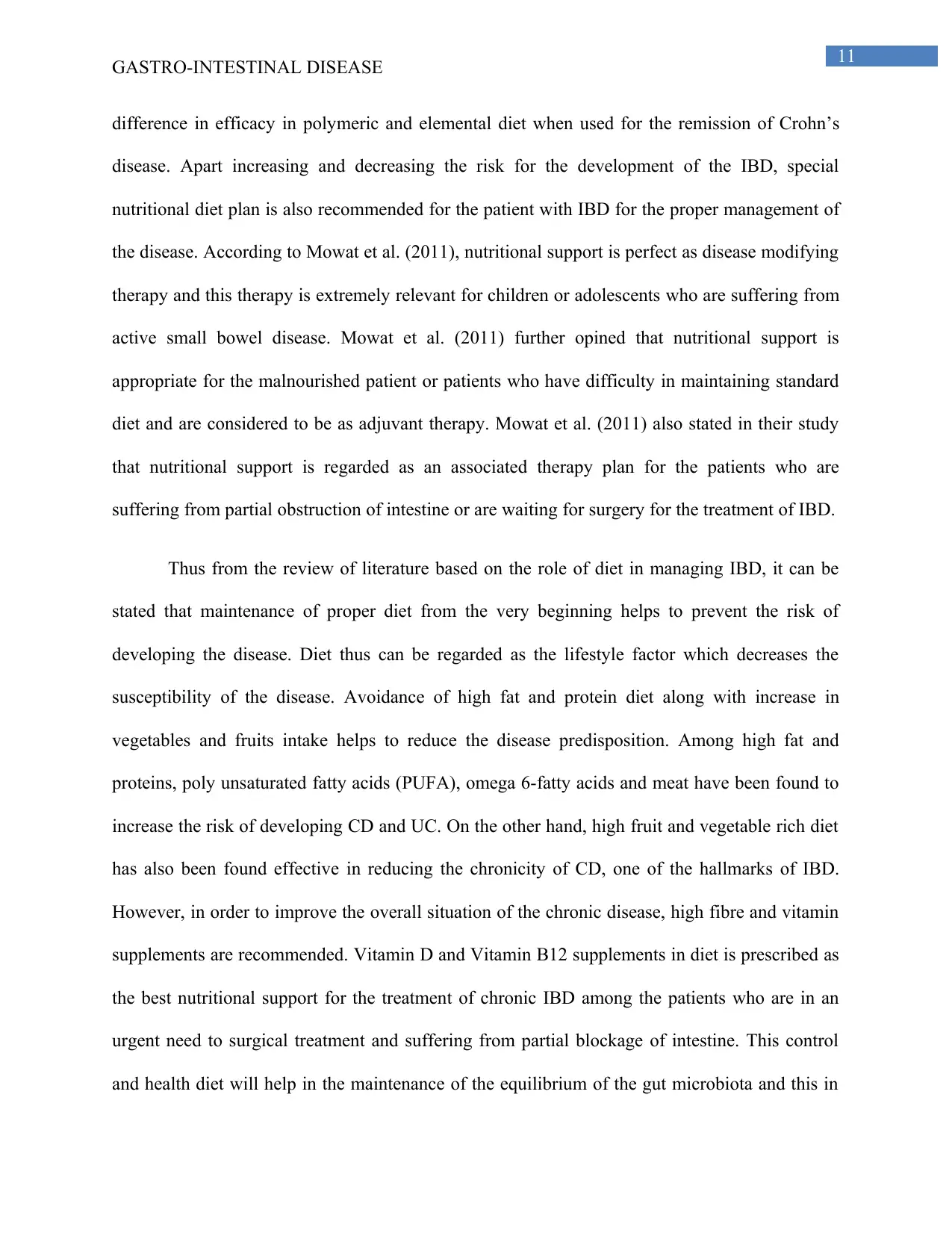
11
GASTRO-INTESTINAL DISEASE
difference in efficacy in polymeric and elemental diet when used for the remission of Crohn’s
disease. Apart increasing and decreasing the risk for the development of the IBD, special
nutritional diet plan is also recommended for the patient with IBD for the proper management of
the disease. According to Mowat et al. (2011), nutritional support is perfect as disease modifying
therapy and this therapy is extremely relevant for children or adolescents who are suffering from
active small bowel disease. Mowat et al. (2011) further opined that nutritional support is
appropriate for the malnourished patient or patients who have difficulty in maintaining standard
diet and are considered to be as adjuvant therapy. Mowat et al. (2011) also stated in their study
that nutritional support is regarded as an associated therapy plan for the patients who are
suffering from partial obstruction of intestine or are waiting for surgery for the treatment of IBD.
Thus from the review of literature based on the role of diet in managing IBD, it can be
stated that maintenance of proper diet from the very beginning helps to prevent the risk of
developing the disease. Diet thus can be regarded as the lifestyle factor which decreases the
susceptibility of the disease. Avoidance of high fat and protein diet along with increase in
vegetables and fruits intake helps to reduce the disease predisposition. Among high fat and
proteins, poly unsaturated fatty acids (PUFA), omega 6-fatty acids and meat have been found to
increase the risk of developing CD and UC. On the other hand, high fruit and vegetable rich diet
has also been found effective in reducing the chronicity of CD, one of the hallmarks of IBD.
However, in order to improve the overall situation of the chronic disease, high fibre and vitamin
supplements are recommended. Vitamin D and Vitamin B12 supplements in diet is prescribed as
the best nutritional support for the treatment of chronic IBD among the patients who are in an
urgent need to surgical treatment and suffering from partial blockage of intestine. This control
and health diet will help in the maintenance of the equilibrium of the gut microbiota and this in
GASTRO-INTESTINAL DISEASE
difference in efficacy in polymeric and elemental diet when used for the remission of Crohn’s
disease. Apart increasing and decreasing the risk for the development of the IBD, special
nutritional diet plan is also recommended for the patient with IBD for the proper management of
the disease. According to Mowat et al. (2011), nutritional support is perfect as disease modifying
therapy and this therapy is extremely relevant for children or adolescents who are suffering from
active small bowel disease. Mowat et al. (2011) further opined that nutritional support is
appropriate for the malnourished patient or patients who have difficulty in maintaining standard
diet and are considered to be as adjuvant therapy. Mowat et al. (2011) also stated in their study
that nutritional support is regarded as an associated therapy plan for the patients who are
suffering from partial obstruction of intestine or are waiting for surgery for the treatment of IBD.
Thus from the review of literature based on the role of diet in managing IBD, it can be
stated that maintenance of proper diet from the very beginning helps to prevent the risk of
developing the disease. Diet thus can be regarded as the lifestyle factor which decreases the
susceptibility of the disease. Avoidance of high fat and protein diet along with increase in
vegetables and fruits intake helps to reduce the disease predisposition. Among high fat and
proteins, poly unsaturated fatty acids (PUFA), omega 6-fatty acids and meat have been found to
increase the risk of developing CD and UC. On the other hand, high fruit and vegetable rich diet
has also been found effective in reducing the chronicity of CD, one of the hallmarks of IBD.
However, in order to improve the overall situation of the chronic disease, high fibre and vitamin
supplements are recommended. Vitamin D and Vitamin B12 supplements in diet is prescribed as
the best nutritional support for the treatment of chronic IBD among the patients who are in an
urgent need to surgical treatment and suffering from partial blockage of intestine. This control
and health diet will help in the maintenance of the equilibrium of the gut microbiota and this in
⊘ This is a preview!⊘
Do you want full access?
Subscribe today to unlock all pages.

Trusted by 1+ million students worldwide
1 out of 34
Related Documents
Your All-in-One AI-Powered Toolkit for Academic Success.
+13062052269
info@desklib.com
Available 24*7 on WhatsApp / Email
![[object Object]](/_next/static/media/star-bottom.7253800d.svg)
Unlock your academic potential
Copyright © 2020–2026 A2Z Services. All Rights Reserved. Developed and managed by ZUCOL.





